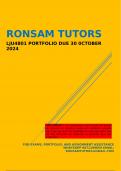RONSAM TUTORS
LJU4801 PORTFOLIO DUE 30 0CTOBER
2024
DISCLAIMER!!!: The assignments sold through this website
are intended for research, study, and reference purposes
only. They are not to be submitted as your own work. Only
use this document as reference to generate your own
assignment
FOR EXAMS, PORTFOLIO, AND ASSIGNMENT ASSISTANCE
WHATSAPP 0671189059 EMAIL:
RONSAMTUTORS@GMAIL.COM
,QUESTION 1
1.
1. Legal Positivism
Legal positivism is a theory that separates law from morality, arguing that laws are
legitimate based on their source and authority, not on any inherent moral value.
Legal positivism views laws as human-made constructs that exist to provide
structure and order within a given society, independent of moral or ethical
considerations. This perspective emphasizes that laws gain legitimacy from being
created and enforced by recognized authorities, who define and apply rules
objectively.1Therefore, a law’s validity is not tied to its moral content but rather to the
adherence to established processes and legal structures. 2
In this case, Pachio’s deliberate handball to prevent a goal from Maluti FC was
penalized with a red card, a ruling that aligns with legal positivist principles.
According to legal positivism, a deliberate handball on the goal line is defined as an
infringement of football rules. Pachio’s punishment receiving a red card was in line
with the clear rule that such an offense warrants immediate dismissal from the
game.3 The positivist framework argues that the application of rules should be
consistent and impartial; therefore, Pachio’s act, regardless of his motives, was dealt
with according to the specific rule that penalizes handball offenses. For positivists,
the “morality” of Pachio’s actions is irrelevant because his punishment is rooted
solely in rule-based logic.4
Shibobo FC’s defense of Pachio’s action aligns with the positivist view, asserting that
his handball was a strategic move within the boundaries of the game’s rules. They
argue that while it resulted in a penalty and a red card, it was a legitimate act within
the strategic framework of football, where every team seeks to advance to the next
stage. Legal positivism would support Shibobo FC’s interpretation that laws are
sufficient to regulate what is legally fair; Pachio acted in a way that was sanctioned
by rules, accepting the prescribed penalty as part of the gameplay. This view implies
1
LJU4801 Study Guide.
2
Frederick Schauer, ‘Positivism as Pariah’ (1989) 16 Law & Phil
3
Joseph Raz, ‘Legal Positivism and the Sources of Law’ (1979).
4
LJU4801 Study Guide.
, that Pachio’s conduct, though penalized, fits within an accepted strategic decision,
one that Shibobo FC defends as part of the competitive nature of sports rather than
an inherently unethical move. For legal positivists, what matters is adherence to
codified rules rather than any additional moral or ethical standards.
2. Natural Law
In contrast, natural law theory posits that law and morality are inherently connected.
Advocates of natural law believe that rules should align with universal principles of
justice and fairness, reflecting a moral order that transcends human-made laws. 5
Natural law holds that true justice extends beyond codified regulations and contends
that laws should support the moral good and uphold ethical standards that foster
respect, integrity, and fairness. This philosophy argues that laws should be
measured against higher ethical principles to ensure that they serve not only order
but also justice.6
In this scenario, Maluti FC’s perspective aligns with natural law principles, as they
argue that Pachio’s handball, though technically punishable by the rules of the game,
violated the ethical basis of fair competition. Natural law advocates would view
Pachio’s action as more than just a breach of rules; they would see it as a
fundamental betrayal of the fair play expected in sports. Natural law theory promotes
the idea that laws and rules, particularly in sports, should cultivate broader values of
integrity and fair competition. Thus, for natural law proponents, rules in sports should
not merely control behavior but foster an environment where fairness and respect
guide participants’ actions.
Natural law theory would suggest that Pachio’s action, while fitting within certain
competitive strategies, ultimately defies the spirit of fair play and sportsmanship. This
philosophy asserts that sports, like law, should operate with an ethical framework
that upholds the broader principles of justice and equity. 7 The disparity between
Pachio’s red card and the consequences for Maluti FC, who missed their penalty and
consequently lost the game, highlights a natural law concern that legal positivism
5
Robert P George, ‘Natural Law and Human Nature’ (2005) 49 Am J Juris.
6
Mark C Murphy, ‘The Natural Law Tradition in Ethics’ (2003) 34 Stanford Encyclopedia of
Philosophy.
7
R H Helmholz, ‘Natural Law and Human Rights in English Law: From Bracton to
Blackstone’ (1996) 22 Journal of Law and Religion.




